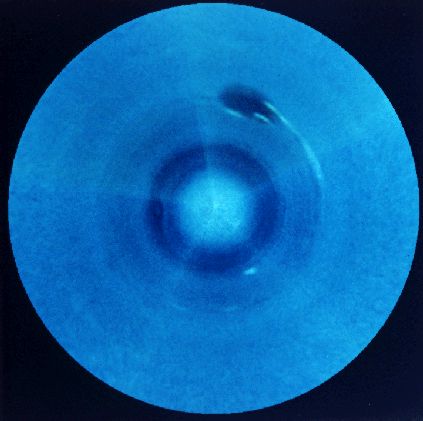 |
Астронет: Астрономическая картинка дня Южное полушарие Нептуна http://variable-stars.ru/db/msg/1165168/eng |
Credit & Copyright: The Voyager Project,
NASA
Explanation:
Neptune, the Solar System's outermost gas giant planet, is 30 times
farther from the Sun than Earth.
Twelve years after
a 1977 launch, Voyager 2 flew by Neptune and
found surprising activity on a planet
that receives only 3 percent as much sunlight as
Jupiter.
In its brief but tantalizing close-up
glimpse of this dim and distant world,
the robot spacecraft recorded pulses of
radio emission, zonal cloud bands,
and large scale storm systems with up to
1500 mile per hour winds - the strongest measured on any planet.
This mosaic of 5 Voyager images shows Neptune's Southern Hemisphere.
Cloud bands and the Earth-sized,
late "Great Dark Spot" with trailing
white clouds located at
about 22 degrees southern latitude are clearly visible.
The distance from the Great Dark Spot feature to Neptune's
South Pole
(image center) is about 17,000 miles.
Authors & editors:
Robert Nemiroff
(MTU) &
Jerry Bonnell
(USRA)
NASA Web Site Statements, Warnings,
and Disclaimers
NASA Official: Jay Norris.
Specific
rights apply.
A service of:
LHEA at
NASA /
GSFC
& Michigan Tech. U.
